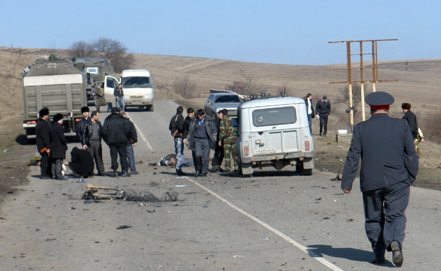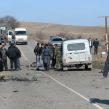
Security Situation in Ingushetia in 2012 Worsened
Publication: Eurasia Daily Monitor Volume: 10 Issue: 9
By:

A review of what happened in the various republics of the North Caucasus in 2012 indicates that the Russian authorities failed to turn the tide in their favor. On the contrary, in some republics, such as Chechnya, Dagestan and Kabardino-Balkaria, there was a noticeable worsening of the security situation.
Last year was the twentieth anniversary of the founding of Ingushetia, the smallest republic in the Russian Federation. Also in 2012, Ingushetia joined several other republics of the North Caucasus where rebel activities increased in 2012 over the previous year. According to Russian media reports, 163 people were killed or injured in insurgency-related attacks in Ingushetia in 2012 compared to 108 in 2011 (www.kavkaz-uzel.ru/articles/218178). Out of the 163 victims, 79 were killed and 84 were injured. Of those, 39 rebels were killed and three were injured, while 30 servicemen were killed and 60 injured. Losses among the civilians were high even without taking into consideration those who disappeared: 10 civilians were killed and 21 were injured.
Rebel sources provide their own figures, which markedly diverge from those given by independent and official sources. The insurgents say they lost eight people in Ingushetia, while government losses in the republic came to 59 killed and 102 wounded (https://kavkazcenter.com/russ/content/2013/01/06/95391.shtml). Thus, according to insurgent sources, the losses in Ingushetia reached nearly 200 people, excluding disappearances (DOSh magazine, #4, 2012). The fact that the rebels recognized only eight deaths out of the 39 that the government claims to have killed means that the rebels regard the remaining 31 people killed as civilians who did not belong to the armed resistance. Overall, the militants assert they carried out nearly 100 attacks against government forces, which also testifies to the increased scope of their activities in 2012 in comparison to 2011 (https://kavpolit.com/evkurov-o-terrorizme-i-dzhixade/).
Ingushetia experienced suicide bombing attacks again in 2012 (https://inosmi.ru/russia/20120820/196926922.html), with eight police officers killed and another 11 wounded in an attack during the funeral for a colleague who had been gunned down earlier in the town of Malgobek. The most curious aspect of the incident was not so much the suicide attack itself, as the fact that a young Chechen from Argun was used to carry it out. This indicates that the resistance has probably abandoned the idea of having separate suicide brigades that it had prior to 2012. This will certainly make the life of the security services more difficult, since they tend to work within the limits of their republics, while the rebels do not recognize those borders.
The climate in Ingushetia’s public sphere remains uneasy. The republic’s Federal Security Service (FSB) branch in Ingushetia shut down the operations of 20 non-governmental organizations on charges that they were cooperating with foreign security services and gathering intelligence information (https://grani.ru/Politics/Russia/FSB/m.207381.html). Only three independent civic organizations remained in the republic, including MAShR, which provides free legal advice for people in the republic who were abused by government agencies. The crackdown on the NGOs allows puppet organizations to replace genuine civic organizations and serve the interests of the government rather than civil society.
In spite of all these issues, the head of Ingushetia, Yunus-Bek Yevkurov, declared that he was overall satisfied with the results of 2012 (https://kavpolit.com/yu-evkurov-dovolen-itogami-2012-go-goda/), hailing the socio-economic achievements of Ingushetia’s government. According to Yevkurov, rebel activities were on a decline. In fact, the figures clearly show the opposite.
Yevkurov’s admission that government agencies were behind some of the kidnappings in the republic could be considered the statement of the year (www.gazeta.ru/news/lenta/2012/02/19/n_2210309.shtml). This was a bold proclamation, which is extremely unusual for North Caucasian leaders, who normally try to defend the activities of Russian agencies in their republics.
Another interesting development was the squabble between the leaders of neighboring Chechnya and Ingushetia. The issue of administrative borders between the two republics was raised by Ingushetia’s leader. He received considerable public support from Ingushetia’s residents, who are restricted by the scarcity of land (www.georgiatimes.info/interview/78857.html). Raising the same issue from the Chechen side, Ramzan Kadyrov received support only from the bureaucratic apparatus, because scarcity of land is less of an issue in Chechnya. Against the backdrop of Yevkurov’s extremely low public opinion poll ratings (www.russian.rfi.fr/kavkaz/20120626-votum-doveriya-glave-ingushetii-stavyat-pod-vopros), the public exchange between him and Kadyrov was a godsend for Ingushetia’s leader.
Yevkurov’s public standing is also influenced by his support from Moscow. For example, the republic was included in the program for developing tourism in the North Caucasus (www.vestikavkaza.ru/news/49934.html). Moscow allotted funds for some infrastructure projects (www.ingushetia.ru/m-news/archives/017194.shtml). Yevkurov also paid attention to the launching of the Nazran-Moscow train. There was also talk of changing the status of the local airport to international. Following the paths of his counterparts in Chechnya and Dagestan, Yevkurov made foreign trips to Kazakhstan and Belgium. Those trips apparently were supposed to show that he is not simply the head of Ingushetia, but also the leader of all Ingush, regardless of where they live. All of these activities looked like an election campaign, although thus far only one person appears to be participating in it—Yevkurov himself.
Ingushetia remained in the news coming from the North Caucasus throughout 2012, and none of the year’s trends suggests that the situation in the republic will change drastically for the better in 2013. On the contrary, the security situation in the republic is deteriorating somewhat. There are several reasons for this. First of all, the rebels in Ingushetia may have finished their internal reorganization after mass arrests and the killing of their leaders in 2010–2012. Second, the unresolved border issue with Chechnya will result in a public outcry in Ingushetia, because the federal authorities will disappoint the republic whatever they decide on the issue. Third, in the run-up to elections for the head of Ingushetia in the autumn of 2013, the confrontation between the authorities and the opposition, which is still in an embryonic stage, will inevitably become more acute.




